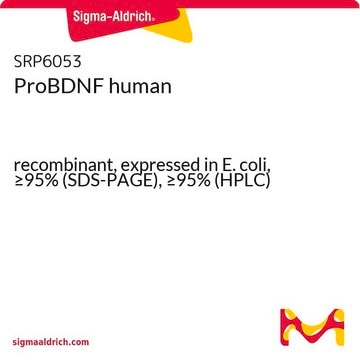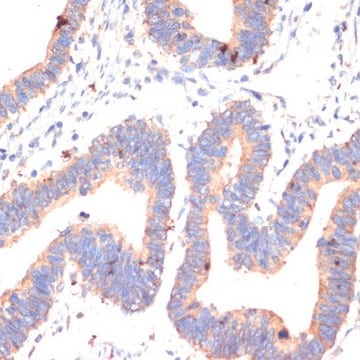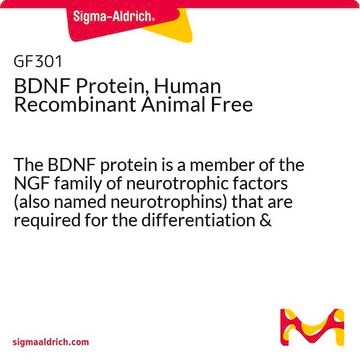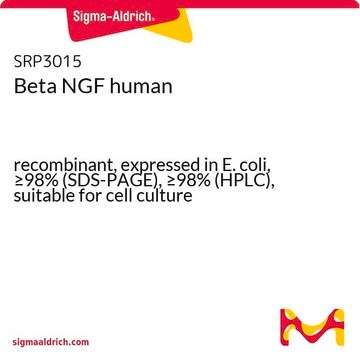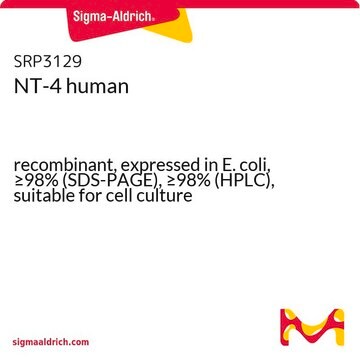추천 제품
제품명
Brain-derived neurotrophic factor human, BDNF, recombinant, expressed in E. coli, lyophilized powder, suitable for cell culture
생물학적 소스
human
Quality Level
재조합
expressed in E. coli
분석
≥95% (SDS-PAGE)
양식
lyophilized powder
품질
endotoxin tested
분자량
~27 kDa
포장
pkg of 10 μg
pkg of 5 μg
저장 조건
avoid repeated freeze/thaw cycles (Do not store in a frost-free freezer.)
기술
cell culture | mammalian: suitable
불순물
≤1.00 EU/μg Endotoxin level
UniProt 수납 번호
저장 온도
−20°C
일반 설명
BDNF is a member of the neurotrophin family of growth factors that includes NGF, NT-3, and NT-4. All neurotrophins have six conserved cysteine residues and share a 55% sequence identity at the amino acid level. BDNF has been shown to enhance the survival and differentiation of several classes of neurons in vitro, including neural crest and placode-derived sensory neurons, dopaminergic neurons in the substantia nigra, basal forebrain cholinergic neurons, hippocampal neurons, and retinal ganglial cells.1 BDNF is expressed within peripheral ganglia and is not restricted to neuronal target fields, raising the possibility that BDNF has paracrine or even autocrine actions on neurons as well as non-neuronal cells.
The active form of BDNF recombinant human protein (27 kDa) is a dimer formed by two identical 119 amino acid subunits held together by strong hydrophobic interactions
The active form of BDNF recombinant human protein (27 kDa) is a dimer formed by two identical 119 amino acid subunits held together by strong hydrophobic interactions
애플리케이션
Brain-derived neurotrophic factor (BDNF) recombinant human protein has been used as a supplement in various types of culture media.
생화학적/생리학적 작용
Brain-derived neurotrophic factor (BDNF) is a 13.6 kDa (or 27.2 kDa dimer) member of the neurotrophin family. BDNF has identical amino acid sequence in human, mouse, and pig with full cross-reactivities. BDNF is important in development and maintenance of neuronal populations within the central nervous system or cells directly associated with it. BDNF has been shown to enhance the survival and differentiation of several classes of neurons in vitro, including neural crest and placode-derived sensory neurons, dopaminergic neurons in the substantia nigra, basal forebrain cholinergic neurons, hippocampal neurons, and retinal ganglial cells.
물리적 형태
lyophilized from a sterile 0.2 μm filtered solution with BSA
분석 메모
The biological activity is determined by its ability to stimulate the proliferation of human neuroblastoma cells, SH-SY5Y.
Storage Class Code
11 - Combustible Solids
WGK
WGK 3
Flash Point (°F)
Not applicable
Flash Point (°C)
Not applicable
개인 보호 장비
Eyeshields, Gloves, type N95 (US)
가장 최신 버전 중 하나를 선택하세요:
시험 성적서(COA)
Lot/Batch Number
이미 열람한 고객
Lisa Oliver et al.
Stem cells and development, 21(15), 2779-2788 (2012-04-24)
Autophagy plays an important role in homeostasis, development, and disease, functioning both as a survival and cell death pathway. However, despite its importance in cell physiology, there is little information about the role of autophagy in stem cells and, in
Differentiation and histological analysis of embryonic stem cell-derived neural transplants in mice.
Y Benninger et al.
Brain pathology (Zurich, Switzerland), 10(3), 330-341 (2000-07-08)
We report here that neural transplantation of in vitro-differentiated embryonic stem (ES) cells provides a versatile strategy for gene transfer into the central nervous system. ES cells were subjected to an optimized in vitro differentiation protocol to obtain embryoid bodies.
Bo Tian et al.
Nature cell biology, 11(2), 211-218 (2009-01-20)
The phosphatidylinositol-3-kinase-like kinase ATM (ataxia-telangiectasia mutated) has a central role in coordinating DNA damage responses, including cell-cycle checkpoint control, DNA repair and apoptosis. Mutations of ATM cause a spectrum of defects ranging from neurodegeneration to cancer predisposition. However, the mechanism
Lisa Oliver et al.
PloS one, 6(5), e19820-e19820 (2011-05-19)
Adult mesenchymal stem cells (MSCs) can be maintained over extended periods of time before activation and differentiation. Little is known about the programs that sustain the survival of these cells. Undifferentiated adult human MSCs (hMSCs) did not undergo apoptosis in
W Sun et al.
Neuroscience, 164(4), 1854-1866 (2009-09-26)
Cochlear spiral ganglion neurons (SGN) provide the only pathway for transmitting sound evoked activity from the hair cells to the central auditory system. Neurotrophic factor 3 (NT-3) and brain derived neurotrophic factor (BDNF) released from hair cells and supporting cells
프로토콜
Step-by-step culture protocols for neural stem cell culture including NSC isolation, expansion, differentiation and characterization.
자사의 과학자팀은 생명 과학, 재료 과학, 화학 합성, 크로마토그래피, 분석 및 기타 많은 영역을 포함한 모든 과학 분야에 경험이 있습니다..
고객지원팀으로 연락바랍니다.



